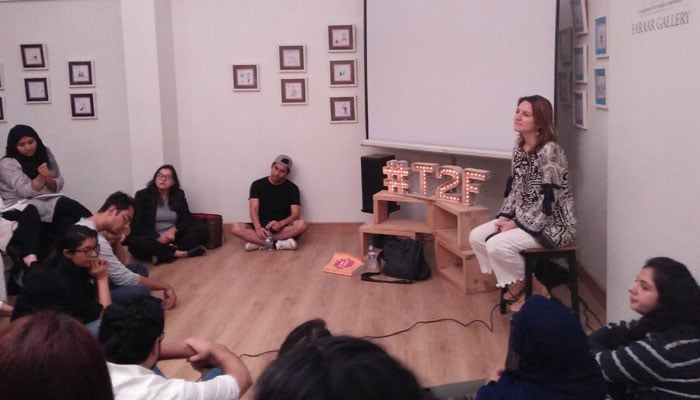Revising concepts of masculinity through documentary art
The 28-minute documentary shed light on some very important aspects of how the society doesn’t allow men to feel emotional, how they are made an outcast for showing their emotional sides, how men themselves feel powerless when they talk about their emotions and how this whole conditioning during the upbringing of boys in our society.
In answer to questions of what it means to be a man in Pakistan, how men deal with the pressure of financially providing for their families and reformation of expectations to let them have a happier life, Aurelie Salvaire interviewed various social activists, entrepreneurs, artists and people from different social and economic backgrounds.
Along with being a French scholar, writer and, speaker, Aurelie is also trainer who has collaborated with international organisations and works actively in the field of social innovation, training women for empowerment. She is also the founder and curator of TEDxBarcelonaWomen and The A Factor.
The 28-minute documentary, screened at T2F on Monday, shed light on some very important aspects of how the society doesn’t allow men to feel emotional, how they are made an outcast for showing their emotional sides, how men themselves feel powerless when they talk about their emotions and how this is conditioned whole conditioning during the upbringing of boys in our society.
“Men should stop dehumanizing each other for showing emotions.” said Sadia Khatri, social activist and journalist.
Psychotherapist Saima Khan said, “As humans, we all need catharsis for all the warped up emotions inside of us. Men in our society are told that emotions are bad for them. They are told not to cry, not to express. They are made fun of when they actually do. Men don’t have a space for their emotional catharsis.”
“If I message my male friends on WhatsApp that I am feeling suicidal, instead of making me feel better they will suggest creative ways of attempting suicide,” shared artist Ali Aftab Saeed. Men don’t know how to deal with their own emotions because they were not taught to do so at all. All they are ever told is to reject and avoid emotions.
What are the expectations surrounding Pakistani men that make them suicidal and depressed on an increasingly large scale and why nobody is talking about it?
One million people commit suicide all over the world every year. Out of those 0.7 millions are men and 90 percent of those suicides are due to depression.
There needs to be more discussion about the expectations, limitations, possibilities for men in our society in order to stop them from committing suicide.
On the statement shared, ‘As a kid, boys are told that they can't cry’, Aurelie invited the men in the audience to share when they were told that it's not ok for them to cry.
A lot of the ones present pretended to ignore the question while one came forward to share how he pursued a career in banking and eventually wanted to be a Montessori teacher. The question his mom asked him was, ‘Who would marry you?’
This led to a discussion about women’s expectations with men. “Women want a macho, strong and wide-built man and are not willing to accept a man who is an ‘emotional being’.”
“Mothers play a huge role in the upbringing of their children and how they keep their sons connected with their emotions and their daughters with their freedom. This they do when they assign roles to their daughters and sons based on their genders.”
Zara Zaman, an entrepreneur felt, “Concepts of masculinity and femininity should be taught as strengths rather than as weaknesses.”
Kamla Bhasin, founder of Sangat South Asian Feminist Network, shared, “Toxic or hegemonic masculinity are problematic. If there is no nurturing, caring it will lead to fear, violence and hatred.”
In order to address the violence coming from men, it is important to realise their disconnection from emotions and their conditioning of ‘not being able to cry’.
“We need to teach our children that emotions have no gender. Whether you are a girl or a boy, you can cry, feel pain, feel shy, feel depressed and you should not be ashamed of it.”
Kamla further said ‘Women aren’t looking for controllers, holders, owners. They want partners, nurturers, carers. They are not machines for earning money and solving all the problems. If they are being perceived as such, then that is a problem.”
Post screening discussion welcomed men and women in the audience to share their experiences of what they expect from the men in their lives and what men expect from their male friends in responding to their emotional stance.
The discussion concluded with mutual agreement from men and women present, on the note that men should be able to show emotions without feeling threatened. Men should be told that they can feel vulnerable and still be ‘human’. They can bring in love, care and nurture to the table and that would be enough for their families.
-
Security forces gun down 30 terrorists in multiple IBOs in KP: ISPR
-
MQM-P calls for new province in Sindh
-
US report validates Pakistan military edge over India: PM
-
Banned TTP poses serious threat to Pakistan security: UNSC panel
-
CM Afridi clarifies remarks on by-poll after ECP requests army deployment
-
Dubai sees 3.2m Pakistani passengers in 2025 as airport sets new milestone
-
Security forces kill 23 Indian proxy terrorists in KP's Kurram
-
Pakistan to construct island to boost oil exploration: report












